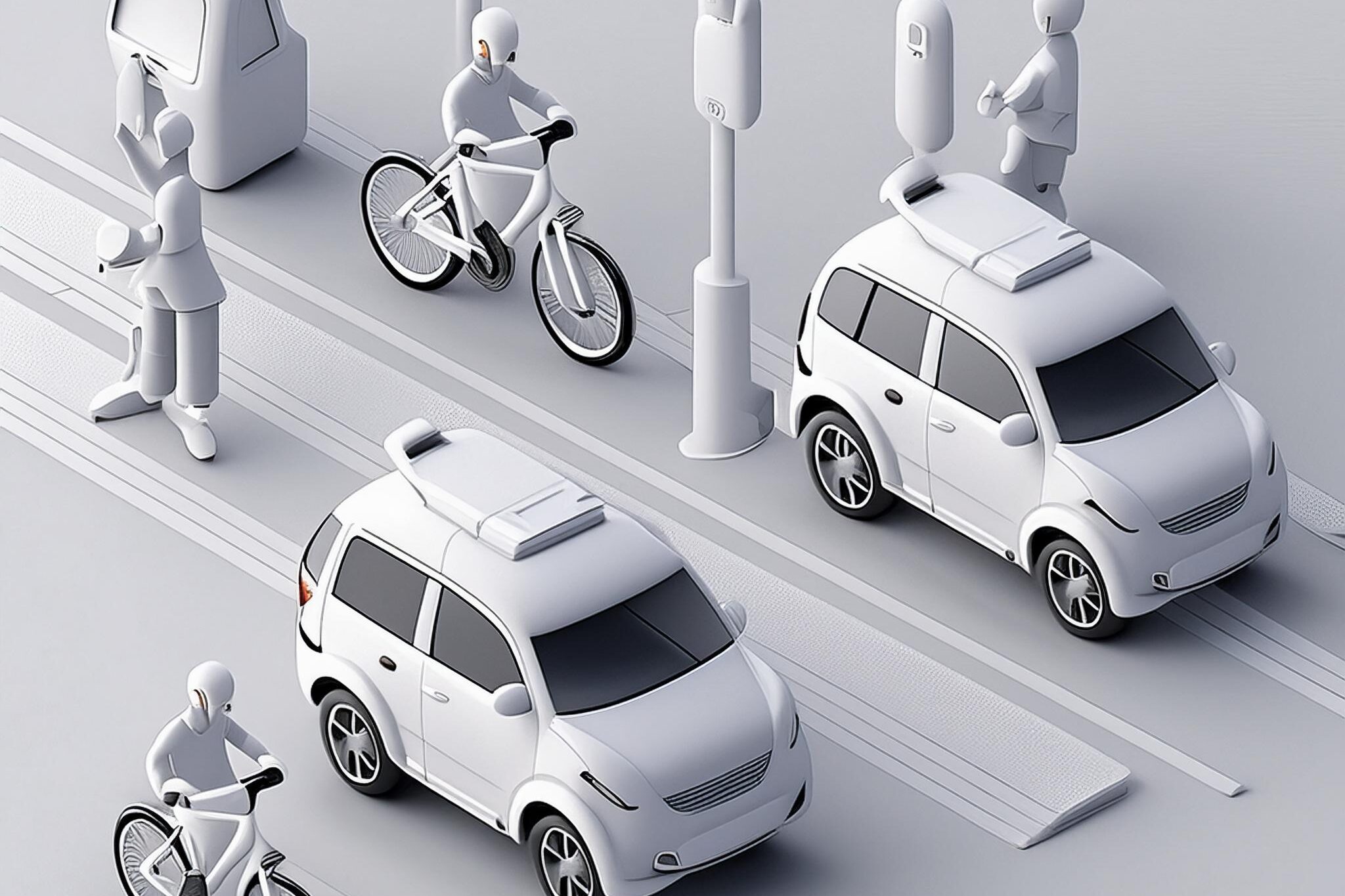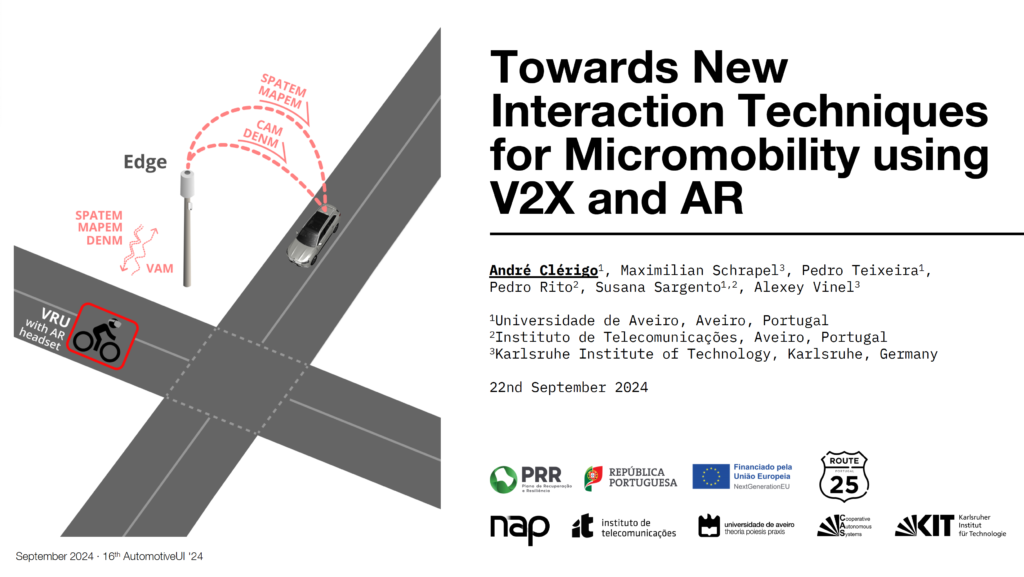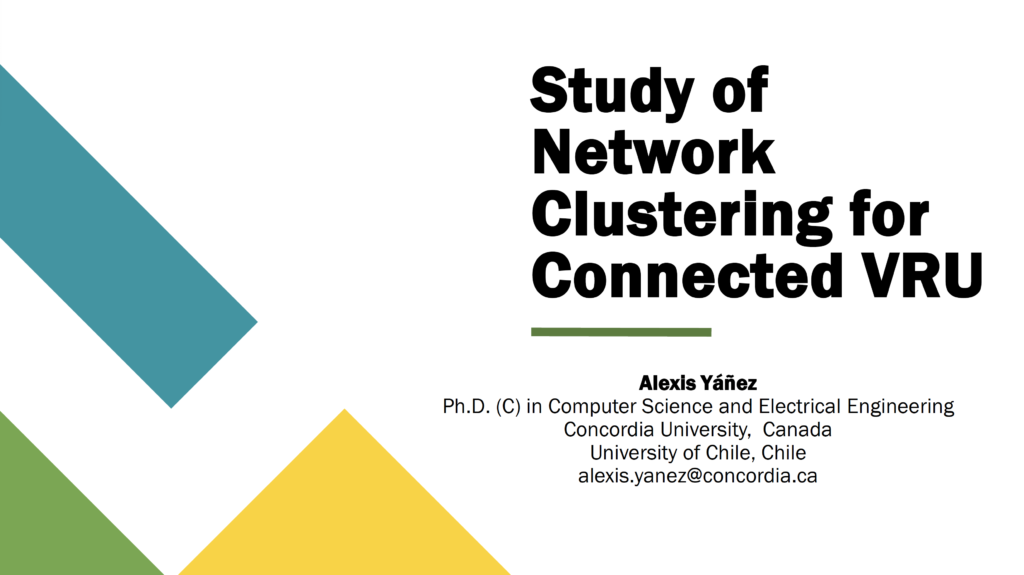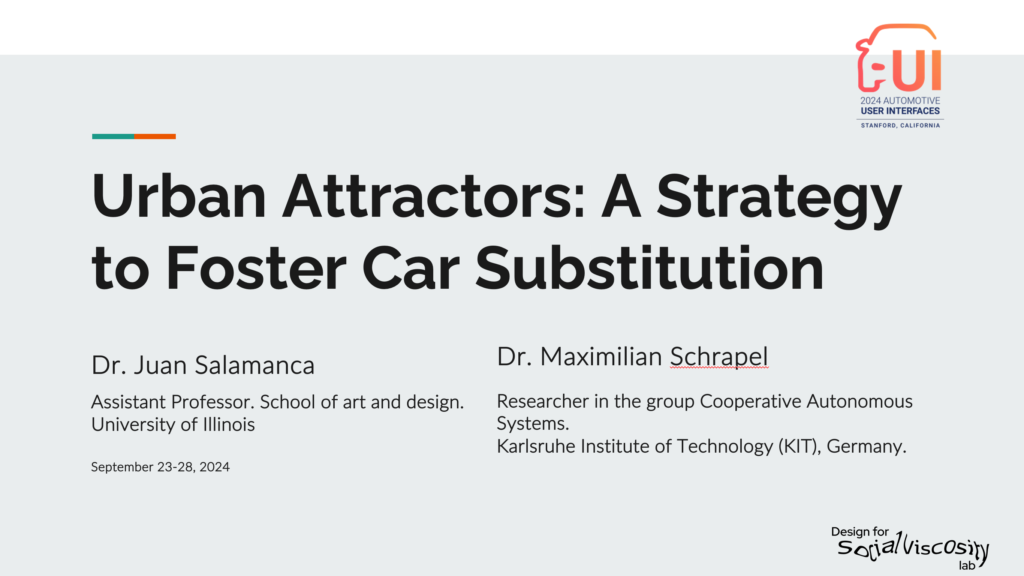First Workshop on Connected Micromobility
for Safe and Sustainable Communities
September 22,2024
Stanford University, California, USA

Introduction and Motivation
In recent years, the concept of micromobility has gained increasing importance as cities and governments worldwide face challenges such as traffic congestion, pollution, segregation, and accessibility. Micromobility, which encompasses modes of transportation such as scooters, bicycles, and small electric vehicles, offers a promising solution to some of these urban challenges. However, the rise of micromobility services entails issues related to user behavior, regulations, standardization and road safety.
Cooperative Intelligent Transport Systems (C-ITS) offer a promising approach by establishing interconnected transportation networks where vehicles, infrastructure, and vulnerable road users (VRU) communicate to collectively improve safety, efficiency, and sustainability rather than focusing solely on individual benefits.
This workshop explores how to integrate micromobility services into C-ITS via smart technologies such as wearables devices, smart helmets, vests, and smartwatches; services extended to two-wheeled vehicles such as navigators, remote throttle, and long-lasting power packs; connectivity of micromobility entities with other vehicles and the infrastructure, such as collective perception messaging and VRU detection services; and policy enforcement such as geofencing. In a nutshell, we will present solutions for enhancing the safety and sustainability of micromobility users and services.
Call for Papers and Dates
We invite researchers, practitioners, and industry experts to submit original research papers, case studies, and position papers related to the workshop’s theme of “Connected Micromobility for Safe and Sustainable Communities.”
All submissions will undergo a peer-review process by the workshop’s program committee. The reviewers will look for the papers’ alignment with the workshop’s goal, novelty of the ideas and vision, and clarity and quality of the manuscript. Accepted papers will be published in the CEUR Workshop Proceedings.
Topics of interest include, but are not limited to:
- Applications for urban and smart environments
- Predicting and influencing road user behavior
- Accessible and inclusive mobility services
- Wearables and augmented reality in road traffic
- Virtual reality simulations
- Evaluation of new technologies in the field
- Applications to support road user’s safety and experience
- Special vehicle applications, e.g., for wheelchairs or cyclists
- Health and well-being applications in mobility
- Sustainable transportation solutions
- AI and Data-driven decision-making in transportation
- Applications to enhance public transportation systems
- Promoting active transportation modes
- Sensing awareness of vulnerable road users
- Challenges in the deployment of road safety applications
- Gamification to promote sustainable mobility
- IoT sensors and platforms to support mobility
- Applications to support cooperation of road users
Submission guidelines
- Submitted papers should be 2 to 4 pages long in the official ACM single-column template.
- Papers should be formatted according to the conference template. You can find the template at https://www.acm.org/publications/proceedings-template
- Submissions should be made electronically through this link.
- Papers must be submitted in PDF format.
Important dates
- Paper submission deadline: September 6 (
August 26, August 16), 2024. - Notification of acceptance: September 9 (
August 30), 2024. - Camera-ready deadline: September 13, 2024.
Expected Outcomes and Future Directions
The workshop aims to contribute to advancing the field of micromobility services and enhancing road safety for all users, including vulnerable road users (VRUs) such as pedestrians and cyclists. Through discussions and presentations, we aim to identify and articulate key challenges inherent in the integration of micromobility services into Cooperative Intelligent Transport Systems (C-ITS). This includes understanding user behavior, regulatory frameworks, standardization issues, and road safety concerns specific to micromobility across the globe. Participants will discuss and brainstorm innovative solutions leveraging wearable devices, IoT sensors, augmented reality, and other emerging technologies to enhance safety, efficiency, and sustainability in urban transportation to explore potential future applications.
By bringing together researchers and industry professionals from diverse backgrounds and geographical locations, the workshop will facilitate knowledge exchange, interdisciplinary collaboration, and the formation of partnerships for future research and development initiatives in the field of micromobility and road safety. Through group discussions and presentations, participants will share insights and experiences related to the deployment of micromobility services and road safety applications. This will lead to the establishment of best practices and guidelines for policymakers, urban planners, and industry stakeholders to promote the safe and sustainable integration of micromobility into transportation systems.
Finally, the workshop will culminate in setting an agenda for future research directions in the field of micromobility and road safety. Participants will identify priority areas for further investigation, potential research questions, and opportunities for funding and collaboration to advance the state-of-the-art in this rapidly evolving domain. Overall, the workshop seeks to generate actionable insights, foster collaboration, and drive innovation to address the complex challenges and opportunities associated with micromobility and road safety in urban environments. By engaging a diverse group of stakeholders, we aim to make meaningful contributions towards creating safer, more efficient, and sustainable transportation systems for all.
Program
September 22, 2024
Session 1: Introduction and lightning talks
09:00 – 09:15 Workshop introduction and overview
09:15 – 10:00 Invited Keynote Dr. Ozan K. Tonguz
10:00 – 10:15 Coffee break
10:15 – 11:00 Invited Keynote Dr. Florian Schiegg
11:00 – 12:00 Lightning talks
Session 2: Establishing guidelines and strategies
12:00 – 12:15 Coffee break
12:15 – 12:45 Group work: New concepts for micromobility services
12:45 – 13:00 Group presentations and discussion
Accepted lightning talks
- Towards New Interaction Techniques for Micromobility using V2X and AR. André Clérigo, Maximilian Schrapel, Pedro Teixeira, Pedro Rito, Susana Sargento and Alexey Vinel.

2. Study of Network Clustering for Connected VRU. Sebastián Díaz, Alexis Yáñez, César Azurdia-Meza and Sandra Céspedes.

3. Urban Attractors: A Strategy to Foster Car Substitution. Juan Salamanca

All lightning presentations and group discussions will be in person
Keynote Speakers
Dr. Ozan K. Tonguz
Ozan K. Tonguz is currently a tenured Full Professor with the Electrical and Computer Engineering Department, Carnegie Mellon University (CMU). He currently leads substantial research efforts at CMU in the broad areas of telecommunications and networking. He is the Founder and CEO of the CMU startup known as Virtual Traffic Lights, LLC, which specializes in providing solutions to acute transportation problems using vehicle-to-vehicle (V2V) and vehicle-to-infrastructure (V2I) communications paradigms. He has published about 300 research papers in IEEE journals and conference proceedings in the areas of wireless networking, optical communications, and computer networks. He is the author (with G. Ferrari) of the book Ad Hoc Wireless Networks: A Communication-Theoretic Perspective (Wiley, 2006). He is the inventor of 21 issued or pending patents (18 U.S. patents and three international patents). His current research interests include vehicular networks, wireless ad hoc networks, sensor networks, self-organizing networks, artificial intelligence (AI), statistical machine learning, smart grid, bioinformatics, and security.
Dr. Florian Schiegg
Florian A. Schiegg (Member, IEEE) is a project Lead at Bosch Research for a large team of research engineers with focus on reliable distributed systems in the automotive, industry 4.0 and building technology domains. Chair of the Bosch V2X Forum, bringing together experts from various business units and coordinating the interface to standardization. He received the degrees in physics and management from the Technical University of Munich, Munich, Germany, in 2016 and 2018. He is currently pursuing the Ph.D. degree in electrical and computer engineering with Leibniz University Hannover, Hannover, Germany, with the co-supervision of Tongji University, Shanghai, China. Since 2017, he has been with the corporate research sector Connected Mobility Systems of Robert Bosch GmbH, Hildesheim, Germany, developing V2X systems for automated driving and future V2X services. His research interests include collective perception, maneuver coordination, and collaborative localization. (Based on IEEE and Linkedin websites).
Workshop organizers
Dr. Maximilian Schrapel
Postdoc in the group Cooperative Autonomous Systems at Karlsruhe Institute of Technology (KIT), Germany. He holds a Ph.D in computer science from the Leibniz University of Hannover, Germany. His current research focuses on connected micromobility vehicles.
Dr. Juan Salamanca
He leads the Design for Social Viscosity Lab at the University of Illinois. The lab aims at studying how to design for collective adaptation in complex socio-cognitive systems. Dr. Salamanca is an Assistant Professor of the School of Art and Design.
Dr. Sandra Céspedes
She leads the Wireless Networking (WiNet) Research Group at Concordia University, Canada. The group works on mobile networking and protocol design for the Internet of Things, LEO satellite IoT networks, connected vehicles, and cyber-physical systems. Dr. Cespedes is an Assistant Professor at the Department of Computer Science and Software Engineering.
Dr. Alexey Vinel
Leads the group Cooperative Autonomous Systems
at Karlsruhe Institute of Technology (KIT), Germany. The lab is working with the V2X-communications and cooperative driving. He a Professor of the Institute of Applied Informatics and Formal Description Methods.
Alexis Yáñez, MSc.
Ph.D Candidate in Computer Science at Concordia University, Canada. He is pursuing a joint degree as a Doctorate Candidate in Electrical Engineering at the University of Chile, Chile. He is a member of the Wireless Networking Research Group (WiNet). His current research focuses on Connected Vulnerable Road User’s Awareness in V2X.
Workshop news
Contact the organizers
Please send an e-mail to maximilian.schrapel@kit.edu